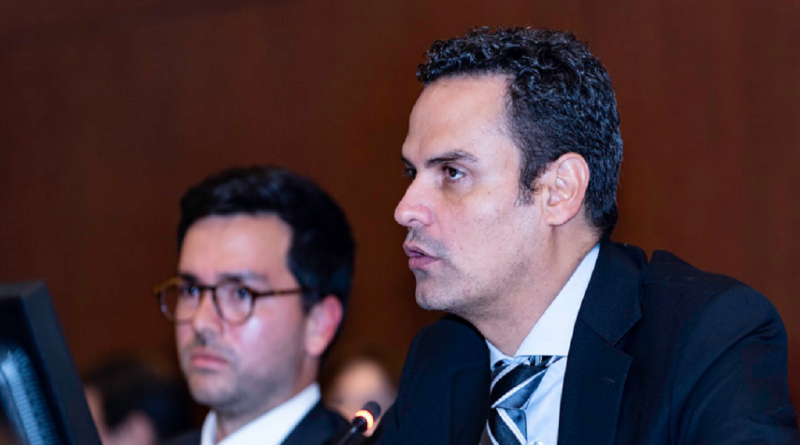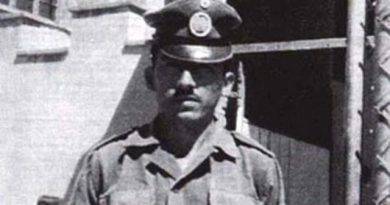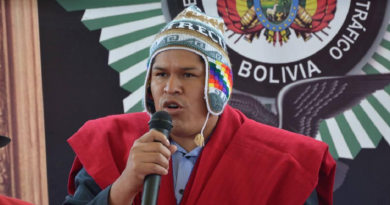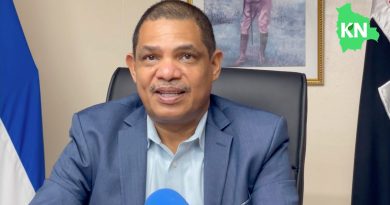The Fight For Justice In Bolivia: Interview
By Oliver Vargas & Kathryn Ledebur
Kawsachun News spoke to Paolo Abrão, former Executive Secretary for the Inter-American Commission on Human Rights. When Abrão was in that role, he visited the victims of the massacres carried out by the coup regime and collected crucial evidence that led the commission to confirm that two massacres were carried out by the coup regime. We spoke to him about the fight to bring those responsible to justice.
You were there in Sacaba in 2019 directly after the massacre, when families from this region were there mourning their dead. How did it feel to be there surrounded by such immense grief?
This visit last year allowed the InterAmerican commission on Human Rights, through various important sources such as testimonies, photos, documents and visits, we identified and documented the excessive use of force by the security forces of the country. We saw how it violated the right to life, the right to protest. We also identified the possible extrajudicial executions through the evidence we collected in the locations where there were the two massacres. We identified the situation of those who were injured by visiting hospitals, we visited the jails where many were being kept. We proved how these detentions were arbitrary. We also listened to the serious reports of torture, mistreatment and other abuses against those who were arrested because they were protesting in the streets because of the situation in the country.
The commission also verified that many of the charges being brought against protesters and others who opposed the political situation, were brought explicitly with a political motivation. All this showed that there was a situation of political persecution against those who were opposed to the de facto government that had just been installed. Of particular concern was that during this critical moment of violation of democracy in the country, there was a propagation of hate speech coming from the new state functionaries that incited violence, incited discrimination against the Indigenous population, and stigmatized those who participated in the protests against the transition of power in the country.
We documented how the police took a formal position of carrying out aggressive repression, but also we saw the presence of civilian armed groups, such as motorbike gangs that were attacking people in the streets. Many of these cases resulted in persons being injured. They also tried to take control of physical space, the streets, and impeded the free circulation of people in public spaces.
So that mission denounced internationally those racist and discriminatory acts, people being humiliated for reasons of race in particular against Inidgenous women. There were other acts of discrimination such as the burning of the Indigenous whipala flag, attacks on groups of journalists and against entire media outlets. It was a difficult situation and verifying it all was also a difficult job, visiting the families of those massacred in Sacaba was extremely sensitive and seeing the pain they were in was not easy. It was not easy to see protesters in hospital with serious injuries, some of whom were receiving treatment with political conditions. It’s not easy to witness such things.
Nevertheless, we saw that there was a strong spirit of resistance among the affected communities, a real determination to mobilize for justice, truth and reparation for the victims.
From the point of view of international law, the gravity of this operation carried out, that was carried out jointly by the police, the military and these para-police civilian groups, all protected by the Supreme Decree 4078 (that gave immunity to those who carried out abuses), all represent a serious of violation of human rights by any international standards. After listening to the victims and verifying the information we received, the commission concluded that two massacres had been carried out.
KL: We saw a pattern of attacks on human rights defenders and social leaders, who did you view that situation in Bolivia under Anez?
Early on we recognised that an atmosphere of intimidation had been installed in the country, huge pressure was applied against civil society groups that sought to denounce the violation of human rights at the time. During our visit, we met with prosecutors and even with police and military officers. When we spoke to them, it was very clear that they were being intimidated and pushed to further obscure the real material and intellectual authors of the massacres. This sort of thing only happens in a time of authoritarianism, when the rule of law is no longer respected. This government denied it all, saying there was no massacre, no use of force, that the victims were shooting at each other. In response to this, we created the GIEI (Independent Group of International Investigators) to go over all the evidence and hopefully work with the national government to obtain justice. The Anez government initially accepted the creation of this group, but then immediately put a number of obstacles to impede the development of the GIEI. We tried for many months to establish this group, but at every turn, Anez regime officials did everything they could to impede it. Maybe they had changed their minds, after having signed the agreement to create the GIEI. Then there were the elections and the new government came to power and made it clear that they do want to work with the GIEI. The group has been installed and I have a lot of hope that they’ll be able to advance in this investigation.
The report by GIEI will be hugely important for Bolivia and its history, because it can help avoid the repetition of these scenarios. Impunity today leads to greater injustices tomorrow. We should all support the work of the GIEI, I hope the pressures that used to exist can disappear and there can be a real commitment to justice and to the victims.
OV: What would you say to those in Bolivia who are angry and frustrated that there hasn’t already been justice or arrests for these crimes?
The Bolivian case has a dimension that goes beyond its national borders. The whole international community should be following this case, because our region, our Latin America has lived through so many coups, so many dictatorial situations and in Latin America we’ve created mechanisms to respond to this. Bolivia was the most recent example of coups that have been installed in the region, the international community must respond forcefully to stop this from spreading to other countries. I ask Bolivians to keep up their spirit of struggle and resistance because it’s vital that you manage a victory on this issue, in the struggle against impunity, this is a struggle for all civil society and all Latin America.



